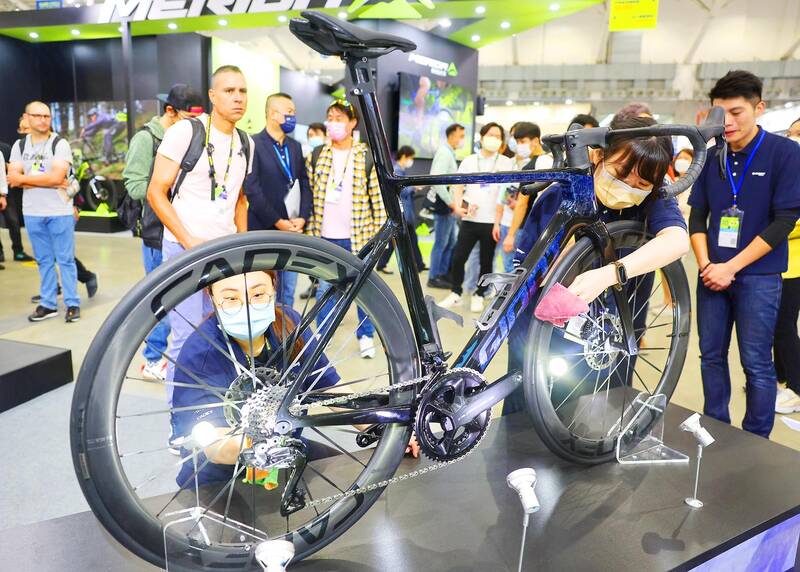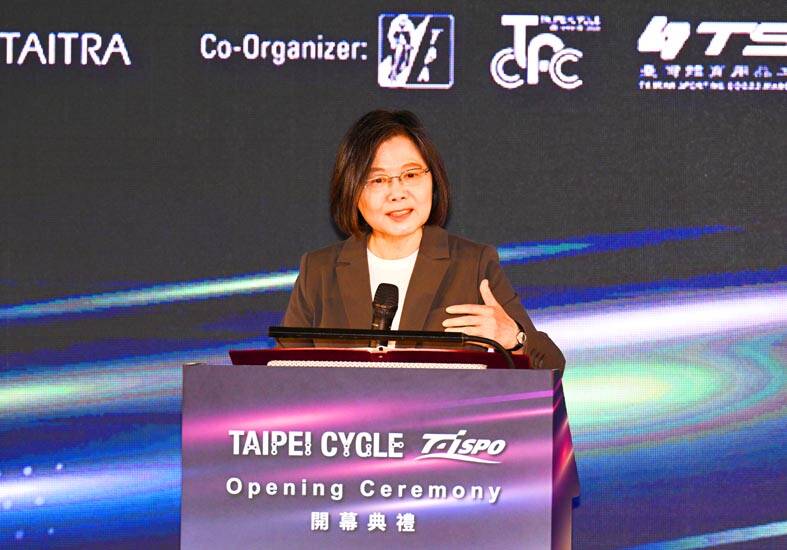The Taipei Cycle show and the Taipei International Sporting Goods Show (TaiSPO) opened at the Taipei Nangang Exhibition Center’s Hall 1 and 2 yesterday, making the exhibitions the first to physically welcome visitors from around the world after Taiwan reopened its borders in October last year.
About 4,000 foreign visitors from more than 90 countries registered in advance to attend the joint fair, which is to include on-site events running through Saturday and digital shows continuing until April 7, the organizer said in a statement yesterday.
The Taipei Cycle and TaiSPO have attracted 1,023 companies, which showcase their products at 3,850 booths, making it the largest cycling and sports fitness industry event in Asia, the Taiwan External Trade Development Council (TAITRA, 外貿協會) said in the statement.

Photo: CNA
The fair also boasts the highest-density business platform for the global high-end bicycle and sports fitness supply chain, TAITRA said, adding that it expects it to result in substantial business opportunities for local firms.
With the launch of several special exhibitions at which products are categorized by usage purpose, it is expected to assist foreign companies to conveniently source products that meet their requirements and the importing countries’ regulations, it added.
“Taiwan is an important center for the production and research and development of bicycles and fitness products. Last year, the output value of bicycles exceeded NT$200 billion [US$6.55 billion], a substantial increase of 23 percent from the previous year, and ranked second in the world,” President Tsai Ing-wen (蔡英文) said at the event’s opening ceremony.

Photo: Tien Yu-hua, Taipei Times
In addition, Taiwan exported more than 1 million electric bicycles last year, Tsai said.
“Taiwan’s fitness equipment, sportswear, protective gear, ball equipment and other sporting goods are also internationally renowned, showing that Taiwan has become a reliable supply chain partner for the global sporting goods industry,” she added.
The annual bicycle industry fair features a variety of tires, seats, frames, lights, breaks, derailleurs, bicycles and electric bikes. Top brands in the industry, such as Merida Industry Co (美利達) and Giant Manufacturing Co (巨大機械) as well as chain maker KMC (Kuei Meng) International Inc (桂盟國際), Japanese bicycle parts maker Shimano Inc and Chicago-based component supplier SRAM Corp, are among the participants this year, the organizer said.
Fitness equipment manufacturers Johnson Health Technology Co (喬山健康科技) and Dyaco International Inc (岱宇國際), two TaiSPO veterans, are also participating in this year’s event, TAITRA said.
However, many exhibitors are attending for the first time, with about 15 percent of firms at Taipei Cycle and 25 percent at TaiSPO being debutants, including leading rubber conveyor belts maker Hsin Yung Chien Co (鑫永銓) and power and thermal management solutions provider Delta Electronics Inc (台達電), the organizer said.

UNCERTAINTY: Innolux activated a stringent supply chain management mechanism, as it did during the COVID-19 pandemic, to ensure optimal inventory levels for customers Flat-panel display makers AUO Corp (友達) and Innolux Corp (群創) yesterday said that about 12 to 20 percent of their display business is at risk of potential US tariffs and that they would relocate production or shipment destinations to mitigate the levies’ effects. US tariffs would have a direct impact of US$200 million on AUO’s revenue, company chairman Paul Peng (彭雙浪) told reporters on the sidelines of the Touch Taiwan trade show in Taipei yesterday. That would make up about 12 percent of the company’s overall revenue. To cope with the tariff uncertainty, AUO plans to allocate its production to manufacturing facilities in

Taiwan will prioritize the development of silicon photonics by taking advantage of its strength in the semiconductor industry to build another shield to protect the local economy, National Development Council (NDC) Minister Paul Liu (劉鏡清) said yesterday. Speaking at a meeting of the legislature’s Economics Committee, Liu said Taiwan already has the artificial intelligence (AI) industry as a shield, after the semiconductor industry, to safeguard the country, and is looking at new unique fields to build more economic shields. While Taiwan will further strengthen its existing shields, over the longer term, the country is determined to focus on such potential segments as

TAKING STOCK: A Taiwanese cookware firm in Vietnam urged customers to assess inventory or place orders early so shipments can reach the US while tariffs are paused Taiwanese businesses in Vietnam are exploring alternatives after the White House imposed a 46 percent import duty on Vietnamese goods, following US President Donald Trump’s announcement of “reciprocal” tariffs on the US’ trading partners. Lo Shih-liang (羅世良), chairman of Brico Industry Co (裕茂工業), a Taiwanese company that manufactures cast iron cookware and stove components in Vietnam, said that more than 40 percent of his business was tied to the US market, describing the constant US policy shifts as an emotional roller coaster. “I work during the day and stay up all night watching the news. I’ve been following US news until 3am

COLLABORATION: Given Taiwan’s key position in global supply chains, the US firm is discussing strategies with local partners and clients to deal with global uncertainties Advanced Micro Devices Inc (AMD) yesterday said it is meeting with local ecosystem partners, including Taiwan Semiconductor Manufacturing Co (TSMC, 台積電), to discuss strategies, including long-term manufacturing, to navigate uncertainties such as US tariffs, as Taiwan occupies an important position in global supply chains. AMD chief executive officer Lisa Su (蘇姿丰) told reporters that Taiwan is an important part of the chip designer’s ecosystem and she is discussing with partners and customers in Taiwan to forge strong collaborations on different areas during this critical period. AMD has just become the first artificial-intelligence (AI) server chip customer of TSMC to utilize its advanced